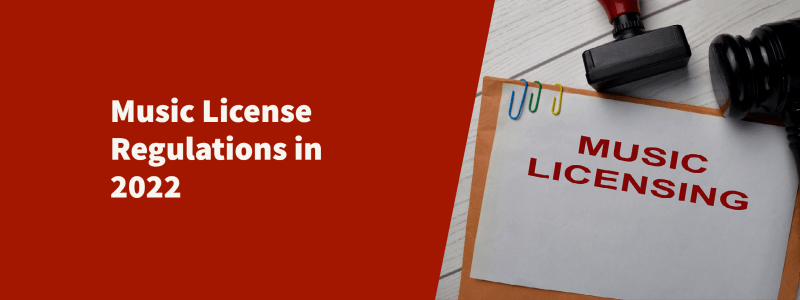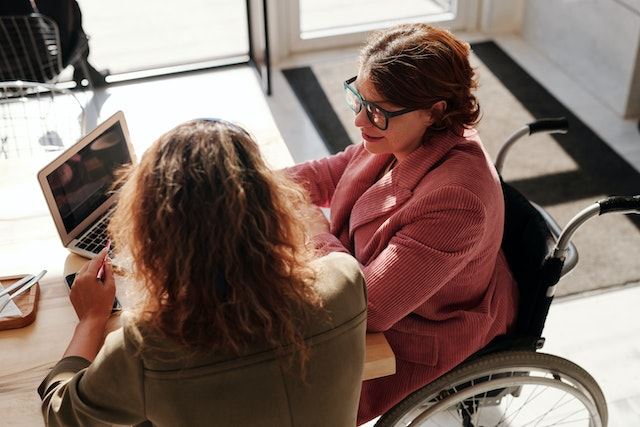Small businesses go through a lot of red tape. Plenty of the regulations make sense; you can understand why employee safety should be a priority, for example. Whereas other picky penalties, like dubious parking charges, may seem beyond reason.
How to cope? Well, the first step is understanding the guidelines and why they’re in place (then, adhering to them becomes second nature).
Can You Play Music in the Workplace?
Let’s say you’re cutting hair, or perhaps you’re looking at spreadsheets, or maybe you’re working through finances and you have music on. It’s in your work space. You’ve got Spotify playing in the background (or any other music streaming platform) and you’re happily tapping your foot to a smoothly curated jazz mix.
Suddenly, someone walks in and hands you a fine.
You’ve been playing recorded music without a licence.
If you didn’t know you needed a licence you’d probably be pretty confused. So lets start at the beginning.
What Does PPL PRS Mean?
PRS for Music, a non-profit copyright collection society, was founded in 1934 to provide musicians (and record companies) with royalties when their music is available to listen to in a non-private setting. However, this seemingly wasn’t without complications, as PRS for Music faced resentment from the general public:
- One hairdresser paid the PRS licence assuming that was that, but the licence only covered copyrights for songwriters, while an additional PPL licence was necessary to cover performers and record companies.
- The Sussex police declined to renew their music licence, meaning officers are forbidden from listening to the radio at work.
- A store assistant faced a bill for thousands of pounds for singing to customers in her place of work. Fortunately, these charges were later dropped.
Today’s PPL PRS Ltd is a combination of two UK music licensing societies: PPL and PRS for Music. This merger took place in February 2018 – prior to this, the companies were completely separate.
So, I guess you’re wondering what this regulatory body means for your business. Is there any chance you could be exempt from their licensing rulings?
Who’s Exempt from Music Licensing Regulations?
Hardly anyone.
Even if you’re just playing the radio to a few employees, this counts as a “public performance” under copyright and legal proceedings.
This may seem slightly confusing, as broadcasters must pay a blanket licence to play these songs, so why should you have to pay for, in essence, re-broadcasting a broadcast?
Well, here’s the government’s straightforward stance on the matter:
You need to get a licence if you:
- play recorded music in public or at your business (including background music on a CD, radio or music channel)
- stage live music events in public (for example, a concert or festival)
- play live or recorded music in a theatre
- use sound recordings in a theatrical production (including on-stage and off-stage effects)
The licence that businesses and the self-employed need to cover all this is called TheMusicLicence.
However, there are exceptions for schools. This is covered under Section 34 of the Copyright, Designs and Patents Act 1988, which sets out an exemption to certain uses of music at “educational establishments”. Nurseries and playgroups, while considered educational, aren’t included.
So, to avoid potential fines, you’ll need to get TheMusicLicence from PPL PRS.
What Copyright Law Applies to Playing Music?
Copyright for music can seem complicated to comply with, especially for small businesses just wanting some ambient music. So, let’s try to summarise another law stemming from the Copyright, Designs and Patents Act 1988.
Copyright law gives copyright holders exclusive rights and controls how music is used. This law asserts that playing a song through the office speakers is a “public performance”, because it’s being broadcast to more than a single individual.
So, how do copyright holder companies like Warner, Sony and others know you’re playing these songs without permission? They enlist collections to a performing rights society like the PPL PRS, who have a wide variety of companies and producers under their service. They’re then allowed to send a legal action notice if your establishment is playing recorded music without their permission.
Ultimately, music is freely available, but it isn’t free to use. Even if you’re already paying for a streaming service.
How Much Does A Music Licence Cost?
According to PPL PRS, the cost of TheMusicLicence…
“…depends on a number of factors including your type of venue and how you use music in your day-to-day operations, whether that be for background purposes or specially featured entertainment.”
Source: https://pplprs.co.uk/playing-music-legally/
If you own a restaurant or café below 400 sqm, with up to 30 seats, you could play music from only 78p a day. For an office or workplace with four employees or less, who are playing background music from a radio, CD, MP3, or other digital devices that are not audible to customers or visitors, your music licence fee would only be from 27p a day. However, if you own a hair and beauty salon with up to 10 treatment chairs, you could play music from a radio, CD, MP3, or other digital device from only 75p a day.
For other sectors, the PPL PRS have a range of tariffs on their website that cover the different uses of music across various venue types.
How Is The Cost Calculated?
Different venue types incur different tariffs, as the source of the music will vary. PPL PRS can calculate the cost of your music licence over the phone, or through an online form. Information on tariffs for the specific sector your business or organisation falls in to, can be found on TheMusicLicence website.

Is the PRS Fine Legally Enforceable?
The PRS music licence is, in theory, a legally enforceable licence. The Copyright, Designs and Patents Act 1988 notes that you must obtain a licence to play any kind of music in which the copyright isn’t owned by you. While this doesn’t count for personal at-home use, it does include any public or for-business use. The PRS licence grants you this permission. If you are found to have played music without a licence, you can legally be fined.
You can find out more about the cost of a PRS fine in our blog PRS for Music – What is it and What is the PRS Fine in 2024?
Small Business Music Licence Regulations: Final Thoughts
People who create music should benefit from their work. PPL PRS ensure that artists and record companies get royalties when their music is played. They then separate money gained from licence fees across different labels under their banner.
Music excluded from PPL PRS’s list is sometimes referred to as “copyright-free” or “royalty-free” music. To use this music, you may need to get permission from those rights holders directly or through a third party (unless the music is covered by the music licence at a later date).
In offices, cafe’s, nurseries and the like, if you’re listening exclusively on headphones then you can listen licence free. When this music goes from the headphones to the stereo, it becomes a “public performance”. If your business is a club, music venue or anywhere where commercial music is played on a day-to-day basis, then, without a doubt, you need the licence.
So, here’s your three options to avoid the landmine of legal fees and still enjoy great music:
- Create your own original music
- Listen privately or don’t listen at all
- Get the licence
Compliance Services from Direct365
Understanding all the regulations doesn’t have to be difficult. At Direct365, we provide small businesses with a variety of compliance services, including Fire Safety, Electrical Safety, Waste Management, Building Facilities and more. While we don’t provide music licensing services, we help thousands of business across the country stay safe, compliant and legal.
Get in touch today to keep your establishment in good health and safety standards.
Please Note: Direct365 cannot provide customers with a licence
Would you like to save 30% on your other business essential services? Do you want to keep the same reliable services? Direct365 can help. Fill out the form below to save money with Direct365.



